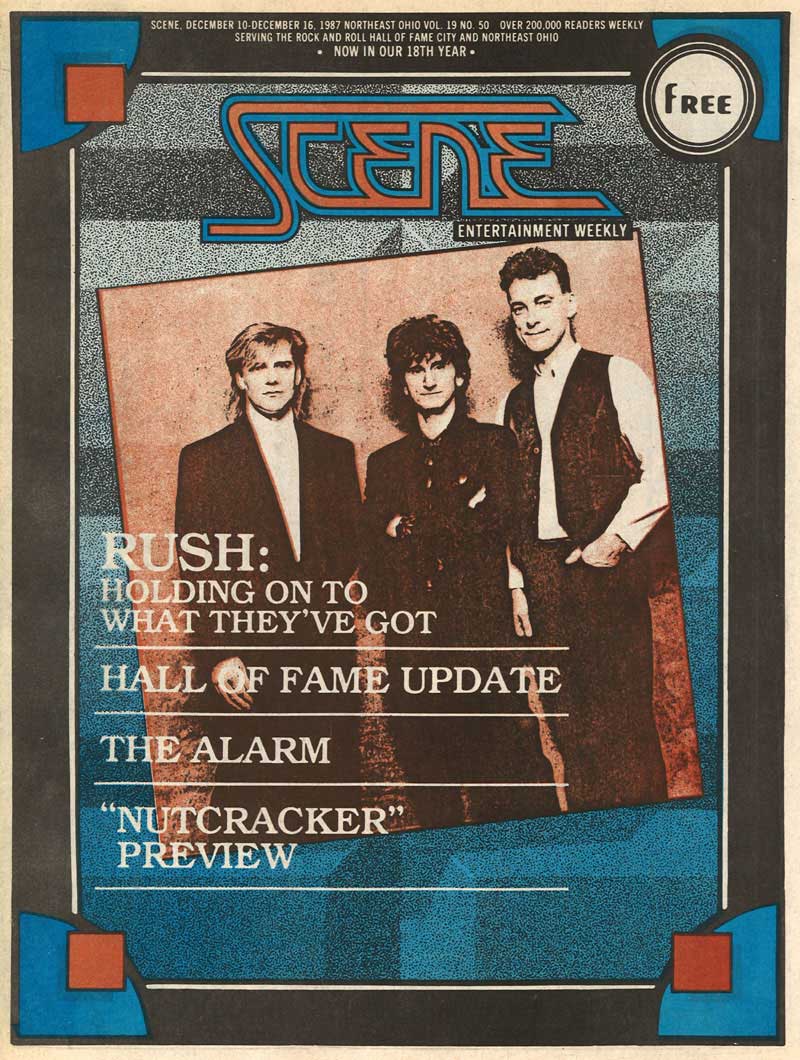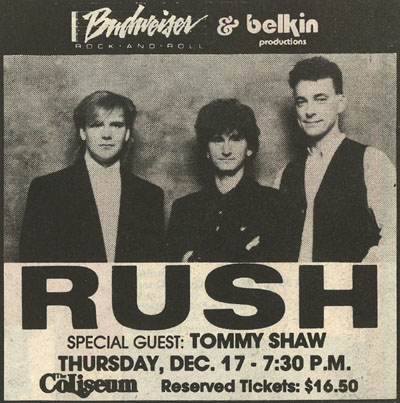Holding On To What They've Got
By Rex Rutkoski, Northeast Ohio Scene, December 10-16, 1987, transcribed by John Patuto

Neil Peart has just gotten the word that he and his bandmates in Rush have been "bumped" by Frank Sinatra.
The Canadian rockers and Sinatra usually don't travel in the same musical circles, but they were scheduled to play the same hall on different nights last weekend.
It seems that a sold-out Sinatra-Liza Minnelli concert at Brendan Byrne Arena in East Rutherford, New Jersey was called off ten minutes before showtime because the orchestra's sheet music never arrived. The Associated Press reported that about 19,000 fans left without incident.
The AP also reported that the show was re-scheduled for last Sunday night (Dec. 6) thereby bumping Rush, who didn't need sheet music, back to Monday.
The reaction of Peart, philosophical writer in this most philosophical of bands, is suitably philosophical.
"No problem," he says in a sonorous radio voice that suggests he is an 'MMS jock rather than a rock drummer. "I like Sinatra."
Though their music is decidedly different than Sinatra's, Rush, like the Chairman of the Board, has built a career on doing things their way.
To hear Peart tell it, that's the only way, regardless of the pitfalls and obstacles of charting such a course.
"I'm probably proudest of just that principle, that we resisted the whole machinery of the modern music world and remained true to what we thought was right."
Musicians and bands just embarking on a career might say that following that philosophy is easier said than done. But Peart, Nancy Reagan not withstanding, suggests, just say no. "That's a simple answer that some people never learn," he says.
"A record company might try to tell a band to do a particular song or a cover of a Tommy James tune," he explains. "But all you have to do is just say no. What do you have to lose? There are many times throughout my career where I've had to do another job to be able to afford to do music that I wanted to play. To me, that's the only choice."
Peart, lead vocalist-bassist Geddy Lee and guitarist Alex Lifeson have made another 50 minutes of the music they wanted to play and sing.
It's Hold Your Fire, Rush's 12th studio album in 13 years together. Rush likes to view each album as the best-to-date in its career. "Of course," Peart says with friendly emphasis as if to suggest that is an artistic fact of life. He still manages to chuckle, though.
Mention of the number of records and the amount of time spent together prompts a discussion of what keeps it all fresh for Peart and his bandmates, if they have to work on avoiding the proverbial burnout factor.
"It's a matter of acquiring the wisdom of what constitutes working too hard and what constitutes burnout," he says. "We learned that in the late '70s, when our popularity grew, and all of a sudden there was more demand for our services than we could possibly deliver."
The irony, he says, is that hungry, young musicians often have the time and not the opportunity, and when the opportunity finally presents itself, it can be difficult to hold yourself back from trying to plunge into everything.
It is natural to think, he says, "people are pushing me around to do all of this stuff. It must be OK. But you have to say no. It's not OK.

"It's OK," he adds with a laugh, "from their point of view" but it's not good for me. You have to assert yourself. We just started pacing ourselves. We've done it now to where we know what's good for us as far as being on the road, how many shows we should do before taking a day off and how many weeks we should do to keep it enjoyable. And for recording, we know we should have some time off and think about material and have enough time to put it all together before we record it, record it at a human pace, too.
"Years ago, we used to work 16-to-18 hours a day, getting up at sunset and going to sleep at sunrise," he says with a laugh. "It was OK for the time, and it worked. But it was very hard on us."
Coming to that understanding of knowing thyself seems to apply to all of Rush's working methods. "In terms of writing," Peart explains, "we have evolved, not a formula, but a method that works for us. I work on the lyrics, and Geddy and Alex work on the music. Then we get together. It's a method that works very well for us."
Rush will probably find the ten songs on Hold Your Fire to be another intriguing investigation into the human condition, both on a personal and societal level.
If the writing and creative process have evolved for Peart and Rush, that process remains one of considerable thought and energy. In the traditional notes in the new press biography for Hold Your Fire, Peart explains that "High Water," the final track, was re-written eight times in one day alone.
"There is an intuitive sense of knowing if it is the best that you can do right now," Peart says. "It may not look as good to you a year later."
Lee and Lifeson provide a valuable air of assistance, he says. "If I show them something and they say, 'it's a little bit vague here. What are you trying to say?' Then I know if they ask me that question, there's a problem."
Songwriting may sometimes seem like a magical process for the layman, but Peart says, "I'd like to debunk the magic aspect of it a bit. One part of it is inspiration, but that moment is so fleeting. All you can do is have the discipline to write it down so that when you sit down to write, you don't have to wait for the Muses to visit. Then it's craftsmanship and the discipline of re-writing and painstaking detail work and having the patience to know when it's right."
He agrees with other composers who say that one of the most rewarding aspects of songwriting is learning that something they have written has touched someone else's life.
"That's definitely so," Peart says, "when you feel that you've communicated with someone, that you've expressed what they're thinking.
"A poet once said that his job was to refine the impressions that fly by most people. It's your job to do that, to find ways to express it. I could never write confessional type of lyrics, but if I can take my own experiences and find a parallel in other people's lives, then I feel like I've really got something."
Prodded to assess the strength of Rush, he allows, "I'd like to think it is things like conviction, sincerity, that everything we do we mean and everything we do we care about. But, in my more cynical moments, I see people just as happy buying fakery and not the real thing, so you can't take too much pride in that."